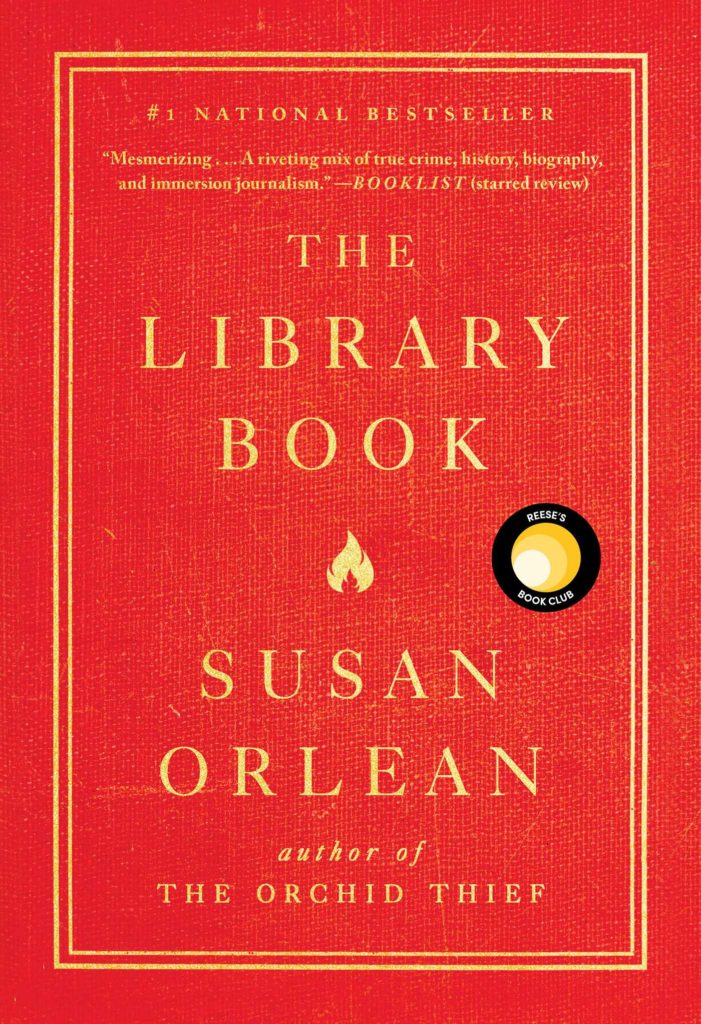
by Susan Orlean, 2018
What a fantastic writer Susan Orlean is! I haven’t read a book that flows this beautifully since Herman Wouk’s, The Caine Mutiny. She details the Los Angeles Public Library fire that happened on April 28, 1986. One of the first things she tells us is why we’ve never heard of this horrible fire that damaged or destroyed a million books and closed the library for 7 years–it’s because the Chernobyl nuclear disaster happened on the same day. Her writing style makes this a page-turner. She builds suspense gradually interspersing it with beautifully written information regarding her childhood, books, libraries, librarians, architecture, homelessness, technology, Los Angeles history, and on and on. Who would have thought a book about libraries could be so interesting and readable! Don’t stop writing, Susan Orlean!
Here are just a few of the many tidbits that stood out for me:
First, I had to look up the word “polymath” as she used it several times in her description of some of the people. A polymath is a person learned in many fields. She also used the word “mercurial” which means changeable, fickle, flighty, erratic.
The publicness of the public library is an increasingly rare commodity. It becomes harder all the time to think of places that welcome everyone and don’t charge any money for that warm embrace.
Many librarians have told me that they consider this the defining question facing libraries right now, and that they despair of finding a balance between welcoming homeless people and somehow accommodating other patrons who occasionally are scared of them or find them smelly or messy or alienating.
Carnegie ended up building nearly 1,700 libraries in 1,400 communities.
Regarding Andrew Carnegie
Throughout her life, Warren published little tip sheets–“Althea’s Ways to Achieve Reading”–to encourage people to find time for books. She approved of fibbing if it gave you an additional opportunity to read. “The night you promised to go to dinner with the best friend of your foster aunt, just telephone that you have such a bad cold you’re afraid she’ll catch it,” she wrote in one of her tip sheets.
Regarding librarian, Althea Warren, in 1930’s
In 1973, the library even added a service called the Hoot Owl Telephonic Reference, which operated from nine P.M. until one A.M., long after the library was closed. Dialing H-O-O-T-O-W-L connected you to a librarian who could find the answer to almost any question. The Hoot Owl slogan was “Win Your Bet Without a Fight.”
Public libraries in the United States outnumber McDonald’s; they outnumber retail bookstores two to one. In many towns, the library is the only place you can browse through physical books.
Sixty thousand Little Free Libraries, in eighty countries around the world, offer book exchanges–take one, give one–housed in wooden cabinets about twice the size of a birdhouse.
The building is a stack of concrete wedges on Aarhus Bay, and the space inside is soaring and open, with views of the water from the reading rooms.
Bill and Melinda Gates got interested in libraries long ago: Supporting public libraries was one of their first charitable projects, before they even formed their philanthropic foundation. The effort began in 1997, with the goal of helping every American library get connected to the Internet. In 2002, after they completed their part in helping wire all the libraries in the United States, the Gateses decided to continue their engagement with libraries and to expand it internationally.
I would like to read one of her other books, “The Orchid Thief.” This writing style is called “immersion journalism” by the “Booklist.” She is a superb writer. Great book!